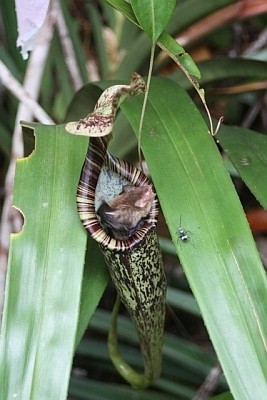Carnivorous pitcher plants that are native to Borneo in Southeast Asia have apparently already evolved special parts that can bounce off ultrasonic calls from bats that turns into a form of "communication" between each other, according to a new study.
This unique relationship between the plant and the flying mammals provides significant benefits such as a temporary home for the bats to roost and rest in that are free from parasites and away from other bats. The pitcher plants then receive much needed fertilizer from the bat droppings.
This evolutionary adaptation from the pitcher plants (Nepenthes hemsleyana) also guides the bats amidst thick vegetation in a tropical forest, that instantly attracts many bats to the region.
According to Caroline Schöner of the Ernst-Moritz-Arndt University of Greifswald in Germany, these plants are now standing out from their environments with these special structures for bats to easily locate them. Bats also have the uncanny ability to distinguish these plants from others that also possess similar shapes but do not provide this soundwave reflector.
Researchers began this new study when they first observed this strange relationship between the plants and bats as the bats have a regular habit of roosting inside pitcher plants.
When the researchers have pinpointed the benefits of the plants and bats to each other, rich fertilizer for the plants and a safe roosting spot for bats, scientists were keen to find out how exactly did the two find each other in a lush environment filled with thick, tropical vegetation.
The pitcher plants apparently use their dish shaped leaves or petals in order to reflect bat calls and make their presence known where they have also grown to become dependent of bats to help them aid in the pollination process.
The pitcher plant works differently and are vastly different from other plants that produces nectar where they have evolved a special mechanism to attract bats for their survival which is an abundant supply of bat guano that is rich in nitrogen.
These new findings also reveal that bats are crucial to the pitcher plants' survival since they have been found to be not very good in catching insects as opposed to its other plant relatives.
Researchers believe that this is how nature adapts through evolution where they solve problems such as obtaining food and maintaining a reproduction process. This new study is published in the journal, Current Biology.



























